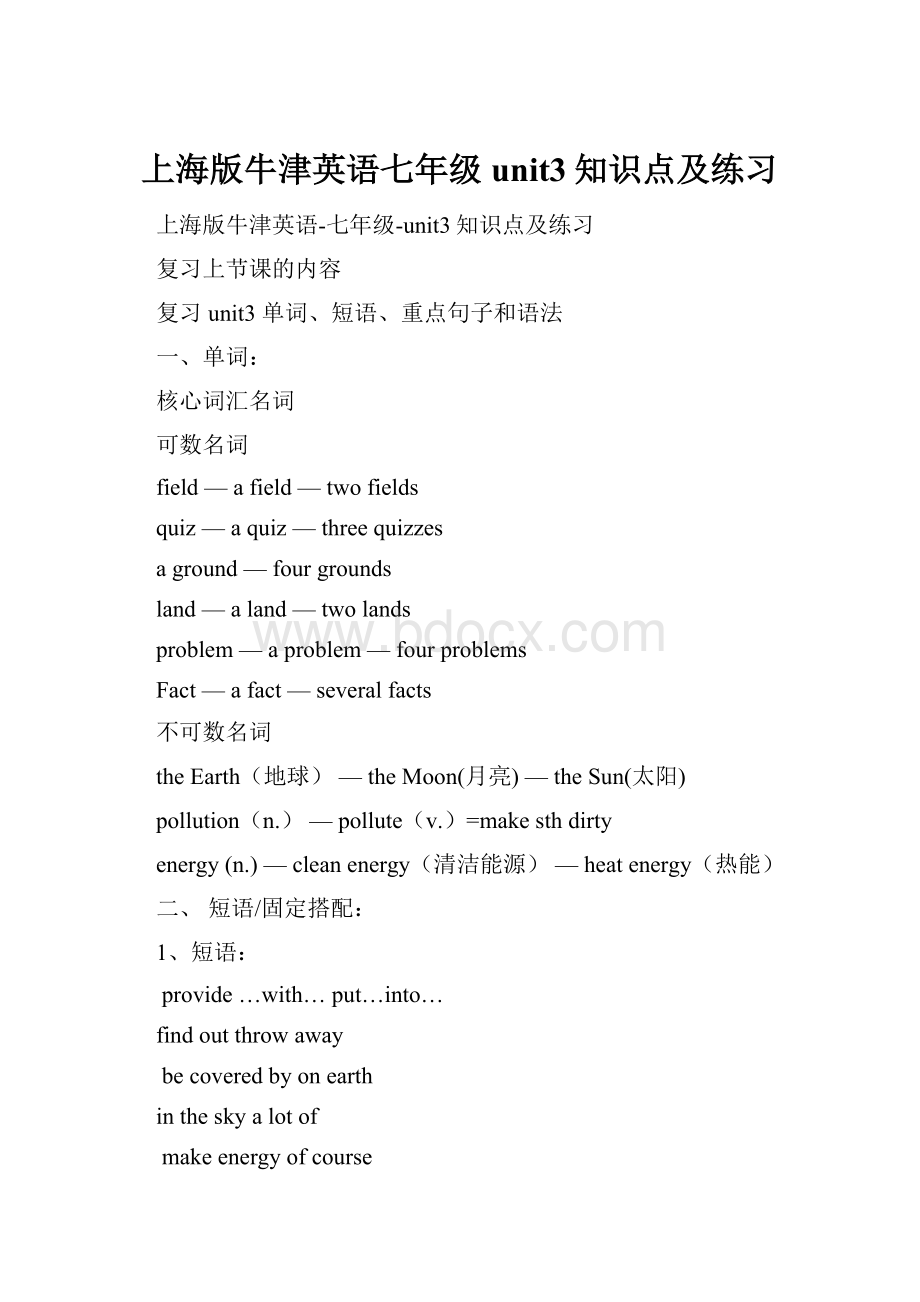上海版牛津英语七年级unit3知识点及练习.docx
《上海版牛津英语七年级unit3知识点及练习.docx》由会员分享,可在线阅读,更多相关《上海版牛津英语七年级unit3知识点及练习.docx(15页珍藏版)》请在冰豆网上搜索。

上海版牛津英语七年级unit3知识点及练习
上海版牛津英语-七年级-unit3知识点及练习
复习上节课的内容
复习unit3单词、短语、重点句子和语法
一、单词:
核心词汇名词
可数名词
field—afield—twofields
quiz—aquiz—threequizzes
aground—fourgrounds
land—aland—twolands
problem—aproblem—fourproblems
Fact—afact—severalfacts
不可数名词
theEarth(地球)—theMoon(月亮)—theSun(太阳)
pollution(n.)—pollute(v.)=makesthdirty
energy(n.)—cleanenergy(清洁能源)—heatenergy(热能)
二、短语/固定搭配:
1、短语:
provide…with…put…into…
findoutthrowaway
becoveredbyonearth
intheskyalotof
makeenergyofcourse
forexampleonequarter
threequartersathome
takealookcomefrom
findoutdifferenttypesof
intheendgetcooler
2、固定搭配:
callsth.sth.
providesb.withsth.
stopdoingsth.
itbe+形容词+forsb.+todosth.
letsb.dosth.
helpsb.dosth.
asksb.(to)dosth.
keepsb.+形容词
三、经典句型:
Therearealsomanypeoplelikeyouandmeonearth.
Itisimportantforustoprotecttheearthforourfuture.
Whatistheweatherlikeindifferentplacesonearth?
四、重点短语
1.protecttheEarth保护地球protectsb/sthfromdoing
我们必须保护那片森林免受火灾。
翻译:
2.providesbwithsth.=providesth.forsb.为某人提供某物=givesbsth=givesthtosb
【拓展】
supplysbwithsth.=supplysth.tosb.为某人提供某物
offersbsth.=offersth.tosb提供某人某物
太阳给我们提供光和热。
翻译:
3.makeenergy制造能源
4.put…into…把……倒入……
他们把废水倒入河中。
翻译:
和put相关的短语:
putonputoffputout
5.stopdoingsth停止做某事
stopsbfromdoingsth阻止某事发生
stoptodosth.停下来去做(另一件)事
王先生进来时,我们停止了谈话。
翻译:
当我们在街道上碰见时,我们停下来说话。
翻译:
6.throwaway扔掉
不要乱扔废纸。
翻译:
7.areporton/about…关于…的一个报告
8.keepsb/sth.safe保证某人/某物的安全
keepsb./sth+形容词保持某人/某物
外套能使你暖和。
翻译:
我们尽最大的努力使我们的学校保持干净、整洁。
翻译:
9.takealookatsw.看一看某地
10.onEarth在地球上
我们生活在地球上。
翻译:
onearth还有“到底,究竟”的意思,置于what,when等疑问词后,以加强问句的语气
这到底是什么东西?
翻译:
onearth还可以作“世上”解,用于最高级以后,以加强语气
我是世界上最幸福的人。
翻译:
相关短语:
ontheland在陆地上inthesky在天上underthewater在水下
11.gowithsth.与……相配;适合于
12.liftsthup举起某物
13.keepsthalive使某物继续存在/使某物继续下去
14.comefromsw.=befromsw.来自(于)
15.asksb(not)todosth.要求某人(不)做某事asksbforsth向某人要某物
16.makesth.clean/dirty使某物干净/弄脏makesbdosth.使某人做某事
17.atthebeginningof…在……之初
【拓展】attheendof在……结尾;在……末端
18.some…some…一些……一些……
这里有许多花园,一些是大的,一些是小的。
翻译:
19.burnsth=setsthonfire燃烧某物
她把书全烧了。
翻译:
20.fewerandfewer越来越少
形容词比较级+and+形容词比较级越来越…….
我们的国家变得越来越强大。
翻译:
常考句型
1.Thereareforestsandrivers,mountainsandfields.(地球上)有森林和河流,山脉和田野。
【辨析】therebe表示“某时/某地有某人/某物”,强调存在关系;have表示“拥有”,强调所属关系。
2.Allplantsneedlightandwater.所有的植物都需要阳光和水。
→Lightandwaterareneededbyallplants.
needsb./sth.todosth.需要某人/物做某事
我需要你帮我。
翻译:
needtodosth.需要做某事
你需要马上去那儿。
翻译:
3.TherearealsomanypeoplelikeyouandmeonEarth.地球上也有很多像你我一样的人。
=TherearemanypeoplelikeyouandmeonEarth,too.
【辨析】also,too,either三者都表示“也”,also和too可以互换,都可以用于肯定句和疑问句,但also常放在句中;too常放在句末,too前面要加逗号;either只用于否定句。
4.TheEarthprovidesuswithair,waterandfood.地球给我们提供空气,水和植物。
=TheEarthprovidesair,waterandfoodforus.
5.ItisimportantforustoprotecttheEarthforourfuture.为了我们的未来,保护地球很重要。
=ToprotecttheEarthforourfutureisimportant.
“It+be+形容词+for+sb.+动词不定式短语”句型,意为:
对某人来说做某事是……it在句首做形式主语,后面的动词不定式短语才是句子的真正主语。
对我们来说学英语很重要。
翻译:
对我们来说学好英语很有用。
翻译:
练习:
I.根据句意及首字母提示写单词,补全句子。
1.WeallliveonE_________.
2.Itisagooddesign(设计)p_________forustolearn.
3.Thismorning,wehaveaq_________aboutMaths.
4.Wemustp_________ourselvesbecausetherearemanydangerousthings.
5.Today,it'smyturntomakear_________onstudying.
II.根据句意及汉语提示写单词,补全句子。
6.Thearmisa_________(部分)ofourbody.
7.Therearemanyplantsonthe_________(陆地).
8.Therearemanykindsofvegetables(蔬菜)inthe_________(田野).
9.Theboxistoo_________(大的)foryoutocarry.
10.Thecountry_________(提供)peoplewithfruit.
11.Thereisalotof_________(污染)inthiscity.
12.Ihaveno_________(能量)togoonrunning!
III.根据汉语提示补全句子,每空一词,缩写算一词。
13.中国有许多漂亮的地方。
Therearemany__________________inChina.
14.关于地球你知道些什么?
Whatdoyou__________________theEarth?
15.这场考试对我来说很重要。
Thisexamisvery__________________me.
16.不要在房子里烧东西,因为很危险。
__________________thingsinthehouse,becauseit'sdangerous.
17.你必须按时睡觉。
You__________________tobedontime.
18.爸爸告诉我不要杀鸟儿。
Fathertellsmenot__________________birds.
19.我有许多书。
有些有趣,有些无聊。
Ihavemanybooks._________areinterestingand_________areboring.
20.我们必须停止工作。
Wemust__________________.
21.今天天气如何?
_________theweather_________today?
22.图书馆有许多不同的书。
Thereare___________________________inthelibrary.
IV.从下面的方框中选择适当的单词或短语并用其正确形式填空,补全句子。
put...into,protect...from,inthesky,much
23.Thereis_________rubbishintheplace.
24.Wecanseealotofkites___________________________.
25.Thelittlegirl_________herhands_________herpockets.
26.Weshould_________oureyes_________beinghurt(被伤害).
五、名词的数
名词按其所表示的事物的性质可分为可数名词和不可数名词两类。
可数名词有复数形式。
不可数名词一般没有复数形式。
可数名词的单数往往要与不定冠词a/an连用,复数则使用其复数形式。
1.可数名词的数:
可数名词复数形式的构成:
1规则变化:
__________________________
如:
cap—cake—
___________________________________
如:
glass—watch—
____________________________________
如:
shelf—knife—
____________________________________________________
如:
story—baby—
_________________________
如:
potato—hero—
②不规则变化:
a.改变元音字母,发音也随之变化:
man(人;男人)—woman(女人)—
postman(邮递员)—fireman(消防员)—
foot(脚)—tooth(牙齿)—tgoose(鹅)—
amanteacher(一名男老师)—
awomannurse(一名女护士)—
b.单复数同形的词:
asheep(一只羊)—afish(一条鱼)—adeer(一头鹿)—
c.通常以复数形式出现的名词:
scissors(剪刀)trousers(裤子)clothes(衣服)glasses(眼镜)shorts(短裤)
d.表示“某国人”的单复数:
单数和复数相同,如:
aJapanese—aChinese—
变man为men,如:
anEnglishman—aFrenchwoman—
词尾加-s,如:
aGerman—anAmerican—
【总结】中日不变,英法变,其他“s”加后面e.
其他形式:
achild—twochildrenanox—threeoxen(三头牛)amouse—fourmice(四只老鼠)
不可数名词的数:
不可数名词通常只有单数形式,前面无需加不定冠词a/an。
如:
water,milk,oil,soil,ink,bread,juice等。
但如果需要表示具体的数量时,要使用以下短语:
aglassofjuiceapieceofpaperasliceofbread
练习:
I.根据句意,用a,an,much或many填空,补全句子。
1.Ieat_________appleeveryday.
2.Mum,Iwanttohave_________orange.
3.Hebuys_________bananas.
4.Inthemorning,Idrink_________milk.5.Hehas_________map.
6.Carlahas_________differentbooks.
7.Thereis_________waterontheroad.
8.Heknows_________differentlanguages.
9.Ibook_________roomformybrother.
10.InChina,thereare__________foreigners(外国人).
六、Therebe句型
1、构成:
Therebe...句型表示的是“某处(存在)有某人或某物”,其结构为Therebe(is,are,was,were)+名词+地点状语。
例如:
Therearefifty-twostudentsinourclass.
Thereisapencilinmypencil-case.
Therewasanoldhousebytheriverfiveyearsago.
1、各种句式:
否定句:
Therebe句型否定句式的构成和含有be动词的其它句型一样,在be后加上“not”。
也可用“no”来表示。
即:
no+n.(名词)=nota\an\any+n.(名词)。
注意:
no+n.(可数名词单数)=nota\an+n.(可数名词单数);
no+n.(可数名词复数)=notany+n.(可数名词复数);
no+n.(不可数名词)=notany+n.(不可数名词)。
例如:
Thereisanorangeinherbag.
→Thereisn’tanorangeinherbag.=Thereisnoorangeinherbag.
Therearesomeorangesinherbag.
→Therearen’tanyorangesinherbag.=Therearenoorangesinherbag.
Thereissomejuiceinthebottle
.→Thereisn’tanyjuiceinthebottle.=Thereisnojuiceinthebottle.
一般疑问句:
Therebe结构的一般疑问句变化只需把be动词移到句首,再在句尾加上问号即可。
例如:
Thereissomemoneyinherhandbag.
→Isthereanymoneyinherhandbag?
(疑问句和否定句中,some改为any,something改为anything.)
Thereissomethingnewintoday’snewspaper.
→Isthereanythingnewintoday’snewspaper?
3、特殊疑问句:
Therebe句型的特殊疑问句有以下三种形式:
1)对主语提问:
当主语是人时,用“Who’s+介词短语?
”;
当主语是物时,用“What’s+介词短语?
”。
其中there在口语中常常省略。
注意:
无论原句的主语是单数还是复数,对其提问时一般都用be的单数形式(回答时却要根据实际情况来决定)。
如:
Thereisabirdinthetree.
→What’sinthetree?
Therearesomebikesoverthere.
→What’soverthere?
Thereisalittlegirlintheroom.
→Whoisintheroom?
②对地点状语提问:
用“Whereis\are+主语?
”表示(注意其答语变化):
例如:
Thereisacomputerinmyoffice.
→Whereisthecomputer?
—It’sinmyoffice.
Therearefourchildrenintheclassroom.
→Wherearethefourchildren?
—They’reintheclassroom.
③对数量提问:
一般有两种提问方式:
如果主语是可数名词,无论是单数还是复数,都用“Howmany+可数名词复数+arethere+介词短语?
”表示
如:
Therearetwelvemonthsinayear.
→Howmanymonthsarethereinayear?
Thereisonlyonebookinmybag.
→Howmanybooksarethereinyourbag?
Thereisacatinthebox.
→Howmanycatsarethereinthebox?
如果主语是不可数名词,则用“Howmuch+不可数名词+isthere+介词短语?
”表示
如:
Thereissomemoneyinmypurse.
→Howmuchmoneyisthereinyourpurse?
4、注意事项:
1.)Therebe句型中be动词的形式要和其后的主语在人称和数上保持一致。
如果句子的主语是单数的可数名词,或是不可数名词,be动词用“is”。
例如:
Thereisabasketballinthebox.
如果句子的主语是复数名词,be动词就用“are”。
例如:
Therearemanybirdsinthetree.
如果有两个或两个以上的名词作主语,be动词要和最靠近它的那个主语在数上保持一致,也就是我们常说的“就近原则”。
例如:
Thereisanorangeandsomebananasinthebasket.
Therearesomebananasandanorangeinthebasket.
2.)Therebe句型和have\has的区别:
Therebe句型表示“存在有”,have\has表示“拥有”“所有”,两者不能同时使用.
例如:
桌子上有三本书。
Therearethreebooksonthedesk.
我有三本书。
Ihavethreebooks.
【总结】Therebe句型有特点,主语放在be后边。
主语单三用is,复数主语要用are。
变否定,很简单,be后要把not添。
变问句也不难,把be提到there前。
肯定句中用some,否定疑问any换。
练习:
I.根据句意,用适当的系动词填空,补全句子。
11.There_________abookandtwopensonthedesk.
12.There_________manyapplesinthebag.
13.There_________muchwaterintheglass.
14.There_________aneggonthetable.
15.There_________manyanimalsinthezoo.
II.将下列句子变成否定句和一般疑问句。
1.Thereissomewaterinthebottle.
2.Therearemanyapplesinthebox.
Ⅲ.单项填空。
( )8.There___not____milkinthecuponthetable.
A.are,many B.are,much C.is,many D.is,much
( )10.Howmany___arethereintheroom?
A.apple B.students C.milk D.paper
( )11.Doyo